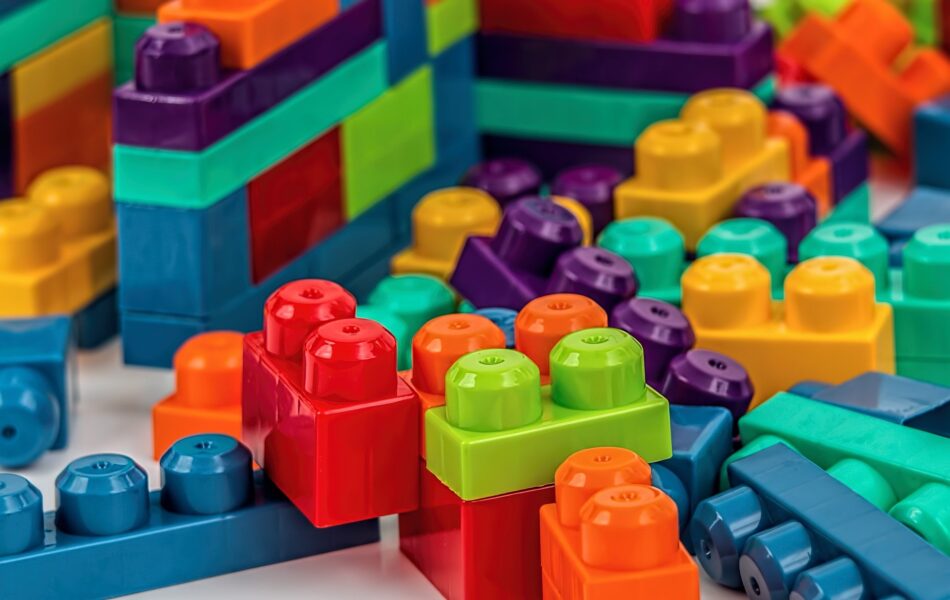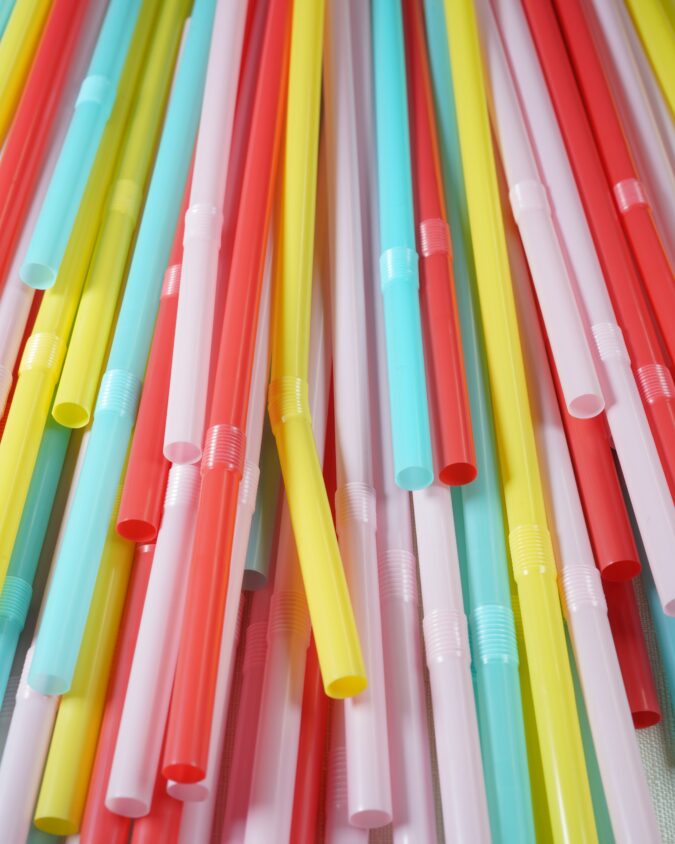
A Guide to Types of Plastic
Identifying different plastics and their properties can be tricky. Working out which types of plastic can be recycled and re-purposed is even harder. Even though there are diverse types of plastic, many of them are recyclable. As a business, you should ensure all plastic waste you produce is recycled when possible, to avoid it ending up in landfill.
To make things easier and help you work out what can and cannot go in the plastic waste bins at your business, we’ve put together this handy guide. Learn about the most common plastic types, their uses, and environmental impact during plastic waste disposal.
Contents
How many types
of plastic are there?
Technically, there are thousands of different types of plastic. However, to make things easier these are grouped together into seven plastic categories. Each of the seven types of plastic has its own number and abbreviation, which you can see in the plastic chart below. While they’re all a form of plastic, what they’re used for and whether they can be recycled differs.
7 types of
plastic chart
Use the below 7 types of plastic chart to quickly and easily identify different plastics, what their main uses are and if you can recycle them.
| Plastic type | Code | Common uses | Is it recyclable? |
| Polyethylene Terephthalate | PET (or PETE) | Plastic bottles for drinks and condiments | Yes – widely recycled |
| High-Density Polyethylene | HDPE | Milk and juice cartons, shampoo bottles, detergent containers | Yes – widely recycled |
| Polyvinyl Chloride | PVC | Pipes, cling film, window frames, credit cards | Yes – but check with recycler |
| Low-Density Polyethylene | LDPE | Shopping bags, squeezy bottles, flexible container lids | Yes – but check with recycler |
| Polypropylene | PP | Bottle caps, medicine containers, takeaway containers | Yes – but check with recycler |
| Polystyrene | PS | Disposable cups, takeaway containers, packing peanuts | Yes – check the polystyrene type |
| Miscellaneous plastics | Other | Medical storage containers, eyeglasses, CDs | No – check with recycler though |

What is Polyethylene
Terephthalate (PET)?
Polyethylene Terephthalate is one of the most common plastic types on the planet, more often known as PET or PETE. It’s a clear, strong, and lightweight material. This makes it one of the most popular types of plastic packaging – it’s used to create around 70% of all plastic bottles and containers in the UK.
Can you
recycle PET?
Yes, PET is widely recyclable. It’s often re-purposed into a variety of different food and drink containers, as well as textiles – such as clothing and carpet. To recycle PET, the plastic needs to be hydrolysed down to monomers. These then go through a purifying process to create new PET products.
What is High-Density
Polyethylene (HDPE)?
High-Density Polyethylene (HDPE) is an incredibly versatile plastic made from petroleum. It’s strong with a high resistance and melting point. Originally developed for pipes in sewers and drains, today HDPE is commonly used to create milk bottles, cleaning product bottles (bleach and anti-bacterial sprays), and personal hygiene products like shampoo and conditioner.
Can you
recycle HDPE?
Yes, HDPE breaks down very easily under extreme temperature highs or lows to be recycled. This makes it one of the most common plastic types that are recyclable. The plastic is rigorously cleaned before being homogenised and granulated to shred it down. It’s often recycled to create new plastic crates, fencing, and other products.
What is Polyvinyl
Chloride (PVC)?
Polyvinyl Chloride (PVC) is one of the oldest synthetic plastics still in use today. It’s the third most-used synthetic plastic in the world after polyethylene and polypropylene. Commonly called PVC or vinyl, it’s used in construction and for industrial production, including a variety of products such as window and door frames, carpet backing, and pipes for homes.
Can you
recycle PVC?
You can recycle PVC but it’s much harder due to its release of harmful toxins. Less than 1% of PVC materials are repurposed each year. However, mechanical or chemical recycling of PVC does happen at some recycling plants. Here it can be re-manufactured to create guttering, traffic cones, panelling and a variety of PVC packaged products.
What is Low-Density
Polyethylene (LDPE) plastic?
Low-Density Polyethylene (LDPE) was one of the first plastics to be produced and shares similar properties with HDPE. It’s highly resistant to impact, moisture, and chemicals, which makes it ideal for various uses. Often LDPE is used for everyday products, such as bin bags, thin-film packaging and plastic bags.
Can you
recycle LDPE?
Yes, and sometimes you can recycle LDPE with HDPE too. It’s one of the most discarded types of plastic waste, with around 75% from households. Fortunately for the environment, there are more and more recycling programs in place, reducing the amount of LDPE ending up in landfill. LDPE is normally recycled into their former products, such as carrier bags, bin bags and shipping envelopes.
What is
polypropylene (PP) plastic?
Polypropylene was discovered in 1951 as a rigid thermoplastic. Generally, it’s used for packaging, such as trays, juice bottles, margarine, and ready meal containers. Other common uses include the creation of plastic parts for machinery, while its unique fibres also mean it can be used for some carpets and heavier-duty upholstery, such as curtains and vehicle upholstery.
Can you recycle
polypropylene?
Polypropylene is generally recyclable, although it depends on the recycling facility – as not all plants have the facilities to recycle polypropylene plastics. Where recycling of PP is available, it’s normally recycled into new products the same as its original purpose. This includes fibres for clothing, kitchen utensils, and industrial materials.
What is
Polystyrene (PS)?
Polystyrene is a type of plastic that can be solid or foam. It emerged in 1839 when a German apothecarist, Eduard Simon, accidentally created it when trying to produce medicine from natural resins. This lightweight and malleable plastic is commonly used to protect packaging and electronic goods, alongside food items, like egg boxes and fast-food containers.
Can you
recycle polystyrene?
Polystyrene is recyclable but it depends on the type. Around 100 tonnes of expanded polystyrene (EPS) are recycled in the UK every month, for example. Despite breaking down effortlessly, polystyrene is one of the most harmful plastics for the environment. Oceans are littered with small pieces of the polymer, so checking if you can recycle your waste polystyrene is essential.
What are Unallocated References
or Miscellaneous Plastics?
For other plastics that don’t fall into any of the six categories above, they’re classed as ‘Unallocated References’. There are many types of plastic materials that fall under this category. Some of these different plastics you may have heard of include polycarbonate, acrylic, fibreglass, nylon and polylactide.
Can you recycle Unallocated References
or Miscellaneous Plastics?
Unfortunately, as this plastic category can include a wide range of different materials, it’s normally a lot harder to recycle – if it’s possible at all. Check and consult the packaging to see if it’s recyclable, especially when it’s all the same type. You should also ask your waste carrier or recycling facility, as they can advise on your specific plastics.
Arrange disposal for
all types of plastic
Whatever types of plastic waste your organisation produces, arrange collection with Business Waste to ensure as much as possible is recycled. Our licensed carriers will deliver free bins for you to fill with different types of plastic materials, then you simply pay for collection.
Request as many plastic recycling bins as you need for collection as a one-off or daily, weekly, or fortnightly schedule. We’ll endeavour to recycle as much of your different types of plastic waste as possible, to help protect our planet. Call 0800 211 8390 or contact us online or with the form below to organise the type of plastic recycling your business needs.
Get your free plastic waste collection quote
Get a fast FREE quote for disposal of all plastic types
- Free quote within 1 hr
- Any type of plastic waste
- FREE bins and delivery
- We cover all of the UK